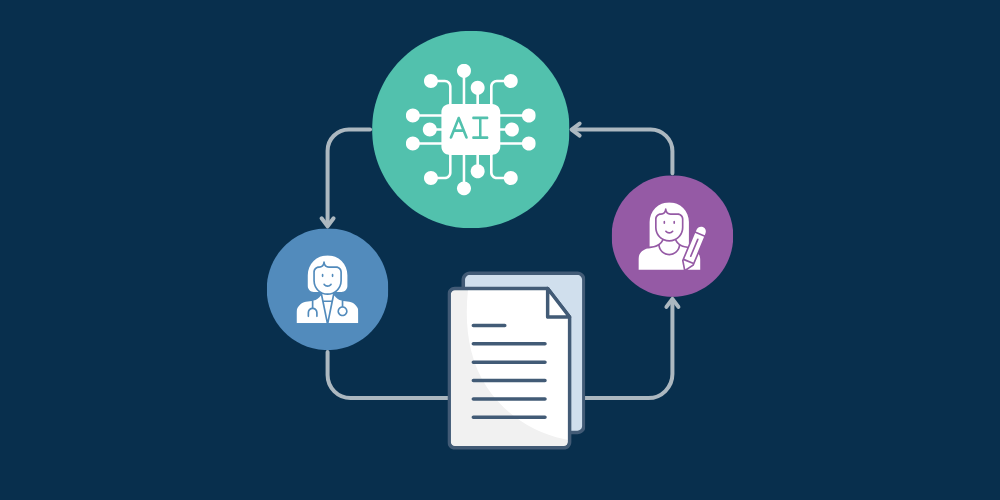
Medical affairs leaders are ready to cut through the buzz and finally get a clear answer to “what can AI actually do for us?”
 I’m Alex Reinthal, and as Vice President of Product at BP Logix, I have a unique vantage point on how AI and machine learning technologies will develop in life sciences software.
I’m Alex Reinthal, and as Vice President of Product at BP Logix, I have a unique vantage point on how AI and machine learning technologies will develop in life sciences software.
In this article, I will share my insights into the future of generative AI and machine learning. I’ll also delve into practical examples of these technologies through demonstrations of an upcoming prototype that is currently in the works for our publication management solution, PubPro.
What I'm hearing from life science leaders
Medical affairs leaders are eager to “be the change” in their organization alongside the R&D and commercial pillars of their organizations. Part of that means being ready to embrace new technologies that can take their work to the next level.
That's why, with the recent flurry of excitement surrounding the potential of AI to transform the life sciences industry, it’s not surprising to see many medical affairs leaders keeping their ear to the ground to determine their next steps.
"I want AI to do the work so my team can focus on strategy."
- Life sciences leader at MAPS 2024
Discussions about how best to harness this technology, however, tend to lean theoretical. With so many buzzwords and vague aspirations floating around, conceptualizing practical applications of AI and quantifying their impact is proving to be a real challenge for medical affairs leaders.
There is clearly enthusiasm for adopting AI-powered solutions, but medical affairs leaders need more to go on than just buzzy jargon. They need a clear answer from software vendors on how artificial intelligence will:
-
Make their day-to-day lives easier
-
Accelerate processes and time-to-market
Practical applications of machine learning and generative AI
At BP Logix, we view investing in AI/ML as the logical next step for workflow automation technology. As we plan out the product roadmap for PubPro, we're making sure that medical affairs teams can fully leverage AI/ML capabilities.
And what exactly do these capabilities entail? I will lay out exactly what we’re working on and explain how it’s going to simplify and speed up your publication management processes.
Machine learning
First up, let’s talk machine learning. Machine learning is a subset of AI that enables systems to learn and improve from experience without being explicitly programmed. With its ability to analyze patterns and predict outcomes, machine learning is an incredibly powerful component of process automation that helps you continuously improve efficiency and accuracy in your day-to-day work.
Advanced machine learning already exists in PubPro — it’s an integral component and administrative feature of Process Director for Life Sciences, the scientific communication platform that PubPro is built on. To build upon the product’s AI/ML features already available to administrators, we’re in the process of making these analytic tools and insights more accessible and usable to everyday users of PubPro.
Through our planned enhancements, users will be able to look at how their processes are performing at a high level, easily identify bottlenecks, and optimize their workflows based on analytics.
Generative AI
Generative AI, distinct from machine learning, refers to AI that can generate new content, from text to images, based on the data it has been trained on.
At BP Logix, we want to use generative AI to help PubPro users find the information they need more easily — and with fewer clicks.
We’re starting with Pathfinder, a LLM-powered AI assistant designed to help users with all things PubPro. Here are three examples of Pathfinder capabilities that will make life easier for PubPro users and speed up publication processes.
1. Analytical capabilities
With Pathfinder, PubPro users will be able to perform conversational searches to quickly generate summaries or detailed analyses of specific publications.
If a user requests an executive summary for a publication, Pathfinder will provide concise, relevant insights instantly that aid the user in strategic decision-making.
Video description: On the PubPro dashboard, the user opens up the Pathfinder chatbot and types in a request for an executive summary of a specific publication (via Pub ID number). Pathfinder conducts a literature analysis and generates an executive summary of this publication. Pathfinder asks the user if they would like to copy the executive summary to their clipboard, and the user says yes. This demonstrates Pathfinder’s ability to perform conversational searches, conduct literature analyses, and generate executive summaries of publications with a LLM integration.
2. Competitive research capabilities
Pathfinder will enhance competitive research in PubPro by enabling users to efficiently query and gather specific market intelligence.
For example, if a user asks for a list of drugs in phase 3 trials for a particular condition, Pathfinder will deliver up-to-date, comprehensive data via an integration with clinicaltrials.gov.
This functionality will not only save time — it will provide a strategic advantage for medical affairs teams that want to maintain their understanding of the competitive landscape.
Video description: On the PubPro dashboard, the user opens up the Pathfinder chatbot and types in the request to aid them in competitive research. Specifically, the user asks Pathfinder to list all drugs treating ulcerative colitis currently in phase 3 trials with their study and study completion date. Pathfinder responds with four drugs that meet the user’s criteria, along with the study info and completion date. This demonstrates Pathfinder’s ability to source data about publications and journals/congresses.
3. System documentation capabilities
With Pathfinder’s ability to reference software documentation, users can ask questions about how to accomplish certain tasks within PubPro and get immediate answers.
To make this feature even more useful, our product roadmap includes plans to eventually equip Pathfinder with the power to navigate users, at their request, to key screens related to their query.
For example, if a PubPro user asks how to adjust due dates for expedited reviews, Pathfinder could not only explain how to make these changes — it could seamlessly redirect the user to the appropriate configuration menu screen to begin carrying out that task.
Video description: On the PubPro dashboard, the user opens up the Pathfinder chatbot and asks how to change due dates for expedited reviews within PubPro. Pathfinder references PubPro system documentation and responds that the setting for expedited review due dates can be found in PubPro’s System Configuration menu page. Pathfinder then asks if the user would like to navigate directly to this page. The user says yes, and then Pathfinder navigates the user to that page.
Looking to the future: Our long-term plans for generative AI
While we already have some exciting AI tools in the works for PubPro, we’re also thinking ahead to what’s next.
One use of generative AI that we’re envisioning for later down the road involves PubPro’s collaborative document editor. We want Pathfinder to help users catch errors and make suggestions for improvement. And we’re not just talking about spell check here. Eventually we could have Pathfinder checking for accuracy on a content substance level. Essentially, AI will provide you with an additional layer of review beyond manual reviewers.
For example, users could have Pathfinder review studies that they're pulling into PubPro and provide feedback. For example, Pathfinder might provide feedback like “When you look at what publications get cited the most, they have ABC characteristics in common. So, you should consider doing XYZ to your publication to make it more effective.”
Over time, this functionality will only get better and better at making sure that your publications are accurate and align with your study information.
Learn more about PubPro
Ready to see our powerful publication management software in action? Contact our team to request a free trial of PubPro.



